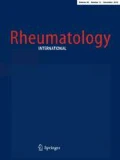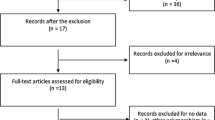Abstract
The aim of this study was to investigate whether the Fc gamma receptor 3A (FCGR3A) 158 V/F and interleukin-6 (IL-6) promoter −174 G/C polymorphisms can predict the response to biologic-based therapy in patients with rheumatoid arthritis (RA). We conducted a meta-analysis of studies on the association between the FCGR3A V/F polymorphism or the IL-6 −174 C/G polymorphism and non-responsiveness to biologic therapy in RA patients. A total of 10 studies involving 1,427 patients were considered. These studies consisted of seven studies on the FCGR3A polymorphism and three studies on the IL-6 polymorphism. Meta-analysis showed no association between the FCGR3A VV+VF genotype and non-responders to biologic therapy [odds ratio (OR) 0.881, 95 % confidence interval (CI) 0.505–1.537, p = 0.655]. However, stratification by biologic type indicated an association between the FCGR3A VV+VF genotype and non-responders to rituximab (OR 0.566, 95 % CI 0.373–0.857, p = 0.007), but no association was found in non-responders to tumor necrosis factor (TNF)-blockers (OR 1.337, 95 % CI 0.869–2.056, p = 0.186). Meta-analysis revealed no association between the IL-6 CC+CG genotype and non-responders to the biologics (OR 3.233, 95 % CI 0.766–13.64, p = 0.110). However, an association was found between the IL-6 CC+CG genotype and non-responders to anti-TNF therapy (OR 8.030, 95 % CI 1.807–33.68, p = 0.006). This meta-analysis demonstrates that FCGR3A V allele carriers show a better response to rituximab, and individuals carrying the IL-6 −174 C allele show a poorer response to anti-TNF therapy for RA. Genotyping for these polymorphisms may be a useful tool for predicting the response to biologics with respect to personalized medicine.


Similar content being viewed by others
References
Harris ED Jr (1990) Rheumatoid arthritis. Pathophysiology and implications for therapy. N Engl J Med 322:1277–1289. doi:10.1056/NEJM199005033221805
Choi SJ, Rho YH, Ji JD, Song GG, Lee YH (2006) Genome scan meta-analysis of rheumatoid arthritis. Rheumatology (Oxford) 45:166–170. doi:10.1093/rheumatology/kei128
Smith JB, Haynes MK (2002) Rheumatoid arthritis—a molecular understanding. Ann Intern Med 136:908–922
Dörner T, Burmester GR (2003) The role of B cells in rheumatoid arthritis: mechanisms and therapeutic targets. Curr Opin Rheumatol 15:246–252
Reff ME, Carner K, Chambers KS, Chinn PC, Leonard JE, Raab R, Newman RA, Hanna N, Anderson DR (1994) Depletion of B cells in vivo by a chimeric mouse human monoclonal antibody to CD20. Blood 83:435–445
Clynes RA, Towers TL, Presta LG, Ravetch JV (2000) Inhibitory Fc receptors modulate in vivo cytotoxicity against tumor targets. Nat Med 6:443–446. doi:10.1038/74704
Brennan FM, Maini RN, Feldmann M (1992) TNF alpha—a pivotal role in rheumatoid arthritis? Br J Rheumatol 31:293–298
Ravetch JV, Bolland S (2001) IgG Fc receptors. Annu Rev Immunol 19:275–290. doi:10.1146/annurev.immunol.19.1.275
Koene HR, Kleijer M, Algra J, Roos D, von dem Borne AE, de Haas M (1997) Fc gammaRIIIa-158 V/F polymorphism influences the binding of IgG by natural killer cell Fc gammaRIIIa, independently of the Fc gammaRIIIa-48L/R/H phenotype. Blood 90:1109–1114
Fonseca JE, Santos MJ, Canhao H, Choy E (2009) Interleukin-6 as a key player in systemic inflammation and joint destruction. Autoimmun Rev 8:538–542. doi:10.1016/j.autrev.2009.01.012
Nürnberg W, Haas N, Schadendorf D, Czarnetzki BM (1995) Interleukin-6 expression in the skin of patients with lupus erythematosus. Exp Dermatol 4:52–57
Fishman D, Faulds G, Jeffery R, Mohamed-Ali V, Yudkin JS, Humphries S, Woo P (1998) The effect of novel polymorphisms in the interleukin-6 (IL-6) gene on IL-6 transcription and plasma IL-6 levels, and an association with systemic-onset juvenile chronic arthritis. J Clin Invest 102:1369–1376. doi:10.1172/JCI2629
Quartuccio L, Fabris M, Pontarini E, Salvin S, Zabotti A, Benucci M, Manfredi M, Biasi D, Ravagnani V, Atzeni F, Sarzi-Puttini P, Morassi P, Fischetti F, Tomietto P, Bazzichi L, Saracco M, Pellerito R, Cimmino M, Schiavon F, Carraro V, Semeraro A, Caporali R, Cavagna L, Bortolotti R, Paolazzi G, Govoni M, Bombardieri S, De Vita S (2014) The 158VV Fc gamma receptor 3A genotype is associated with response to rituximab in rheumatoid arthritis: results of an Italian multicentre study. Ann Rheum Dis 73:716–721. doi:10.1136/annrheumdis-2012-202435
Kastbom A, Cöster L, Ärlestig L, Chatzidionysiou A, van Vollenhoven RF, Padyukov L, Rantapää-Dahlqvist S, Saevarsdottir S (2012) Influence of FCGR3A genotype on the therapeutic response to rituximab in rheumatoid arthritis: an observational cohort study. BMJ Open 2. doi:10.1136/bmjopen-2012-001524
Ruyssen-Witrand A, Rouanet S, Combe B, Dougados M, Le Loët X, Sibilia J, Tebib J, Mariette X, Constantin A (2012) Fcγ receptor type IIIA polymorphism influences treatment outcomes in patients with rheumatoid arthritis treated with rituximab. Ann Rheum Dis 71:875–877. doi:10.1136/annrheumdis-2011-200337
Tsukahara S, Ikari K, Sato E, Yamanaka H, Hara M, Tomatsu T, Momohara S, Kamatani N (2008) A polymorphism in the gene encoding the Fcgamma IIIA receptor is a possible genetic marker to predict the primary response to infliximab in Japanese patients with rheumatoid arthritis. Ann Rheum Dis 67:1791–1792. doi:10.1136/ard.2007.086892
Kastbom A, Bratt J, Ernestam S, Lampa J, Padyukov L, Söderkvist P, Skogh T (2007) Fcgamma receptor type IIIA genotype and response to tumor necrosis factor alpha-blocking agents in patients with rheumatoid arthritis. Arthritis Rheum 56:448–452. doi:10.1002/art.22390
Tutuncu Z, Kavanaugh A, Zvaifler N, Corr M, Deutsch R, Boyle D (2005) Fcgamma receptor type IIIA polymorphisms influence treatment outcomes in patients with inflammatory arthritis treated with tumor necrosis factor alpha-blocking agents. Arthritis Rheum 52:2693–2696. doi:10.1002/art.21266
Cañete JD, Suárez B, Hernández MV, Sanmartí R, Rego I, Celis R, Moll C, Pinto JA, Blanco FJ, Lozano F (2009) Influence of variants of Fc gamma receptors IIA and IIIA on the American College of Rheumatology and European League against rheumatism responses to anti-tumour necrosis factor alpha therapy in rheumatoid arthritis. Ann Rheum Dis 68:1547–1552. doi:10.1136/ard.2008.096982
Morales-Lara MJ, Conesa-Zamora P, García-Simón MS, Pedrero F, Santaclara V, Perez-Guillermo M, Soriano-Navarro E (2010) Association between the FCGR3A V158F polymorphism and the clinical response to infliximab in rheumatoid arthritis and spondyloarthritis patients. Scand J Rheumatol 39:518–520. doi:10.3109/03009741003781969
Dávila-Fajardo CL, Márquez A, Pascual-Salcedo D, Moreno Ramos MJ, García-Portales R, Magro C, Alegre-Sancho JJ, Balsa A, Cabeza-Barrera J, Raya E, Martin J (2014) Confirmation of −174G/C interleukin-6 gene promoter polymorphism as a genetic marker predicting antitumor necrosis factor treatment outcome. Pharmacogenet Genomics 24:1–5. doi:10.1097/FPC.0000000000000013
Jančić I, Arsenović-Ranin N, Sefik-Bukilica M, Zivojinović S, Damjanov N, Spasovski V, Srzentić S, Stanković B, Pavlović S (2013) 174G/C interleukin-6 gene promoter polymorphism predicts therapeutic response to etanercept in rheumatoid arthritis. Rheumatol Int 33:1481–1486. doi:10.1007/s00296-012-2586-y
Fabris M, Quartuccio L, Lombardi S, Saracco M, Atzeni F, Carletto A, Cimmino M, Fabro C, Pontarini E, Pellerito R, Bambara LM, Sarzi-Puttini P, Cutolo M, Manfredi M, Benucci M, Morassi P, Fischetti F, Padovan M, Govoni M, Curcio F, Tonutti E, De Vita S (2012) The CC homozygosis of the −174G>C IL-6 polymorphism predicts a lower efficacy of rituximab therapy in rheumatoid arthritis. Autoimmun Rev 11:315–320. doi:10.1016/j.autrev.2010.06.012
Lee YH, Nath SK (2005) Systemic lupus erythematosus susceptibility loci defined by genome scan meta-analysis. Hum Genet 118:434–443. doi:10.1007/s00439-005-0073-1
Lee YH, Harley JB, Nath SK (2006) Meta-analysis of TNF-alpha promoter −308 A/G polymorphism and SLE susceptibility. Eur J Hum Genet 14:364–371. doi:10.1038/sj.ejhg.5201566
Nath SK, Harley JB, Lee YH (2005) Polymorphisms of complement receptor 1 and interleukin-10 genes and systemic lupus erythematosus: a meta-analysis. Hum Genet 118:225–234. doi:10.1007/s00439-005-0044-6
Wells G, Becker JC, Teng J, Dougados M, Schiff M, Smolen J, Aletaha D, van Riel PL (2009) Validation of the 28-joint Disease Activity Score (DAS28) and European League against rheumatism response criteria based on C-reactive protein against disease progression in patients with rheumatoid arthritis, and comparison with the DAS28 based on erythrocyte sedimentation rate. Ann Rheum Dis 68:954–960. doi:10.1136/ard.2007.084459
van Riel PL, Schumacher HR Jr (2001) How does one assess early rheumatoid arthritis in daily clinical practice? Best Pract Res Clin Rheumatol 15:67–76. doi:10.1053/berh.2000.0126
Davey Smith G, Egger M (1997) Meta-analyses of randomised controlled trials. Lancet 350:1182
Higgins JP, Thompson SG (2002) Quantifying heterogeneity in a meta-analysis. Stat Med 21:1539–1558. doi:10.1002/sim.1186
Egger M, Smith GD, Phillips AN (1997) Meta-analysis: principles and procedures. BMJ 315:1533–1537
DerSimonian R, Laird N (1986) Meta-analysis in clinical trials. Control Clin Trials 7:177–188
Evans WE, Relling MV (1999) Pharmacogenomics: translating functional genomics into rational therapeutics. Science 286:487–491
Lee YH, Rho YH, Choi SJ, Ji JD, Song GG (2006) Association of TNF-alpha −308 G/A polymorphism with responsiveness to TNF-alpha-blockers in rheumatoid arthritis: a meta-analysis. Rheumatol Int 27:157–161. doi:10.1007/s00296-006-0175-7
Genovese MC, Bathon JM, Martin RW, Fleischmann RM, Tesser JR, Schiff MH, Keystone EC, Wasko MC, Moreland LW, Weaver AL, Markenson J, Cannon GW, Spencer-Green G, Finck BK (2002) Etanercept versus methotrexate in patients with early rheumatoid arthritis: two-year radiographic and clinical outcomes. Arthritis Rheum 46:1443–1450. doi:10.1002/art.10308
Weinblatt ME, Keystone EC, Furst DE, Moreland LW, Weisman MH, Birbara CA, Teoh LA, Fischkoff SA, Chartash EK (2003) Adalimumab, a fully human anti-tumor necrosis factor alpha monoclonal antibody, for the treatment of rheumatoid arthritis in patients taking concomitant methotrexate: the ARMADA trial. Arthritis Rheum 48:35–45. doi:10.1002/art.10697
Arend WP (2001) The innate immune system in rheumatoid arthritis. Arthritis Rheum 44:2224–2234
Lee YH, Ji JD, Song GG (2008) Associations between FCGR3A polymorphisms and susceptibility to rheumatoid arthritis: a metaanalysis. J Rheumatol 35:2129–2135
Catrina AI, Trollmo C, af Klint E, Engstrom M, Lampa J, Hermansson Y, Klareskog L, Ulfgren AK (2005) Evidence that anti-tumor necrosis factor therapy with both etanercept and infliximab induces apoptosis in macrophages, but not lymphocytes, in rheumatoid arthritis joints: extended report. Arthritis Rheum 52:61–72. doi:10.1002/art.20764
Jones KG, Brull DJ, Brown LC, Sian M, Greenhalgh RM, Humphries SE, Powell JT (2001) Interleukin-6 (IL-6) and the prognosis of abdominal aortic aneurysms. Circulation 103:2260–2265
Morse HR, Olomolaiye OO, Wood NA, Keen LJ, Bidwell JL (1999) Induced heteroduplex genotyping of TNF-alpha, IL-1beta, IL-6 and IL-10 polymorphisms associated with transcriptional regulation. Cytokine 11:789–795. doi:10.1006/cyto.1999.0491
Lee YH, Bae SC, Choi SJ, Ji JD, Song GG (2012) The association between interleukin-6 polymorphisms and rheumatoid arthritis: a meta-analysis. Inflamm Res 61:665–671. doi:10.1007/s00011-012-0459-1
Acknowledgments
This study was supported in part by a grant of the Korea Healthcare technology R&D project, Ministry for Health & Welfare, Republic of Korea (HI12C1834).
Conflict of interest
None.
Author information
Authors and Affiliations
Corresponding author
Rights and permissions
About this article
Cite this article
Lee, Y.H., Bae, SC. & Song, G.G. Functional FCGR3A 158 V/F and IL-6 −174 C/G polymorphisms predict response to biologic therapy in patients with rheumatoid arthritis: a meta-analysis. Rheumatol Int 34, 1409–1415 (2014). https://doi.org/10.1007/s00296-014-3015-1
Received:
Accepted:
Published:
Issue Date:
DOI: https://doi.org/10.1007/s00296-014-3015-1



